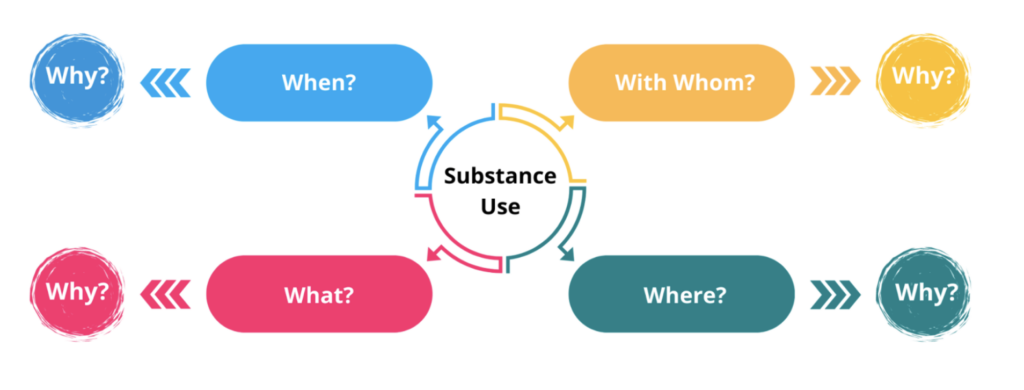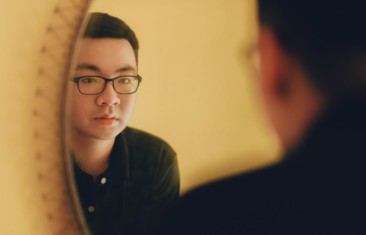What if we allowed ourselves to look at substance use without being afraid or feeling judged? What would we learn if we were open and curious? Could this change our thoughts about using substances and lead us to make healthier choices?
Often, changing how we use substances—whether cutting back or stopping—is seen as a response to substance use problems, which prevents people from reflecting on their habits, let alone making changes. But, if we can remove the stigma and start talking openly about substance use, it becomes easier to make positive changes in our lives.
The Spectrum of Substance Use: A Deeply Personal Experience
Everyone’s relationship with substances is different.
While weekly consumption guidelines can be a helpful starting point, the patterns of substance use are often far more complex and personal. How much and how often you use may not capture all of the complexities of your substance use. But by understanding the bigger picture, you’ll enhance your self-awareness and better align your habits with your values.
We each have our own unique patterns and reasons for what, when, and why we consume substances, and these answers will be different for everyone. Substance use can range from regular indulgence to occasional use, and may be influenced by different internal and external factors. The truth is that many people turn to substances to “help” manage various aspects of life, whether to ease pain, reduce stress, overcome inhibitions, have fun, feel connected or to just relax.
No matter where you fall on the spectrum of substance use, this article will offer you practical questions and tips to help you reflect on your habits and build a healthier foundation for your wellbeing.
First Steps to Think About Your Substance Use
Recognizing patterns and habits starts with the willingness to ask meaningful questions and to answer them honestly, with curiosity and without judgment. This is essential for deeper self-awareness and lasting behavioural changes.
Ask yourself the following questions about your substance use. Don’t be afraid to dig deep and get specific.
When do I turn to substances?
- Is it a certain time of day? Certain days of the week? Does when depend on external factors, like special events? Or internal factors, like when I feel stressed, anxious or excited? Am I indulging more routinely or on occasion?
With whom do I indulge?
- Do I indulge only with specific people, or alone? Am I selective about my company when indulging?
Where do I turn to substances?
- Within the privacy of my own home? At the pub? At celebratory events?
What substance(s) do I lean towards?
- Do I lean more towards alcohol, cannabis, hallucinogens or stimulants? Is my choice dependent on my environment?
Consider using the diagram below as a base to map out your thoughts:

These questions will provide you with a blueprint as to when you turn to substances. The next step is to add the why at the end of each question.
Why do you indulge under the above circumstances? Feel encouraged to continuously question why to as many answers as necessary to discover the deeper value or need behind your reason. Consider the example below:

Once you understand why you don’t feel comfortable, why you find it hard to relax, or why you feel so unseen, you can begin to separate the “need” for substances from the root cause. This will allow you to tend to the deeper need more directly, with healthier coping mechanisms.
Practical Strategies
Whether you’re looking to reduce your substance use or make more mindful choices, here are some tips to help you attain your goals.
- Experiment: Take a break from substances to see how you feel during life events and day-to-day activities
- Journal: Use a journal to keep track of changes to your moods, motivation, presence, energy levels, sleep quality, and relationships. Keep asking yourself these questions.
- Suggested Journal Prompts:
- What is my personal definition of problematic substance use?
- What do I fear losing by changing substance use habits and practicing more intentional usage?
- How and from whom did I learn to indulge in the ways I do? Do I still share the same values that I was raised with?
- What do I feel I could gain from changing my habits? What opportunities might I find and why?
- Suggested Journal Prompts:
- Question your impulses: When you hear that inner voice saying “I need a drink” at the end of a long day, question it. Let the urge fully come into your awareness and ask yourself “why?” Evaluate whether it aligns with your personal goals, beliefs and values.
- Find other pleasures: Discover activities that bring you joy without substances. This could be spending time with the people who make you feel loved and more alive, picking up a fun hobby, or enjoying healthy snacks and drinks.
- Build community: You might notice varying levels of support from people as you make changes. Stay steadfast in your goals and spend time with those who support your choices and help you feel good about your goals. Be confident in your commitments and share your journey with people you trust.
Conclusion
While this may be the start of your journey to take control of your substance use and feel more connected to your decisions, remember that it’s not something you can fail at.
Every insight and choice is an opportunity to build a healthier relationship with substances. The key is to be mindful and intentional about when, where, what and with whom you indulge, while also understanding the “why” behind it.
Understanding and changing your substance use habits helps you align yourself more closely with your beliefs and values, ultimately improving your overall quality of life. Over time, many people find these changes boost their self-esteem, energy, sleep, and ability to manage stress without relying on substances.
To learn more, understand, and change your substance use habits, log into your Starling Minds account and check out the new “Transforming Your Substance Use” module.




